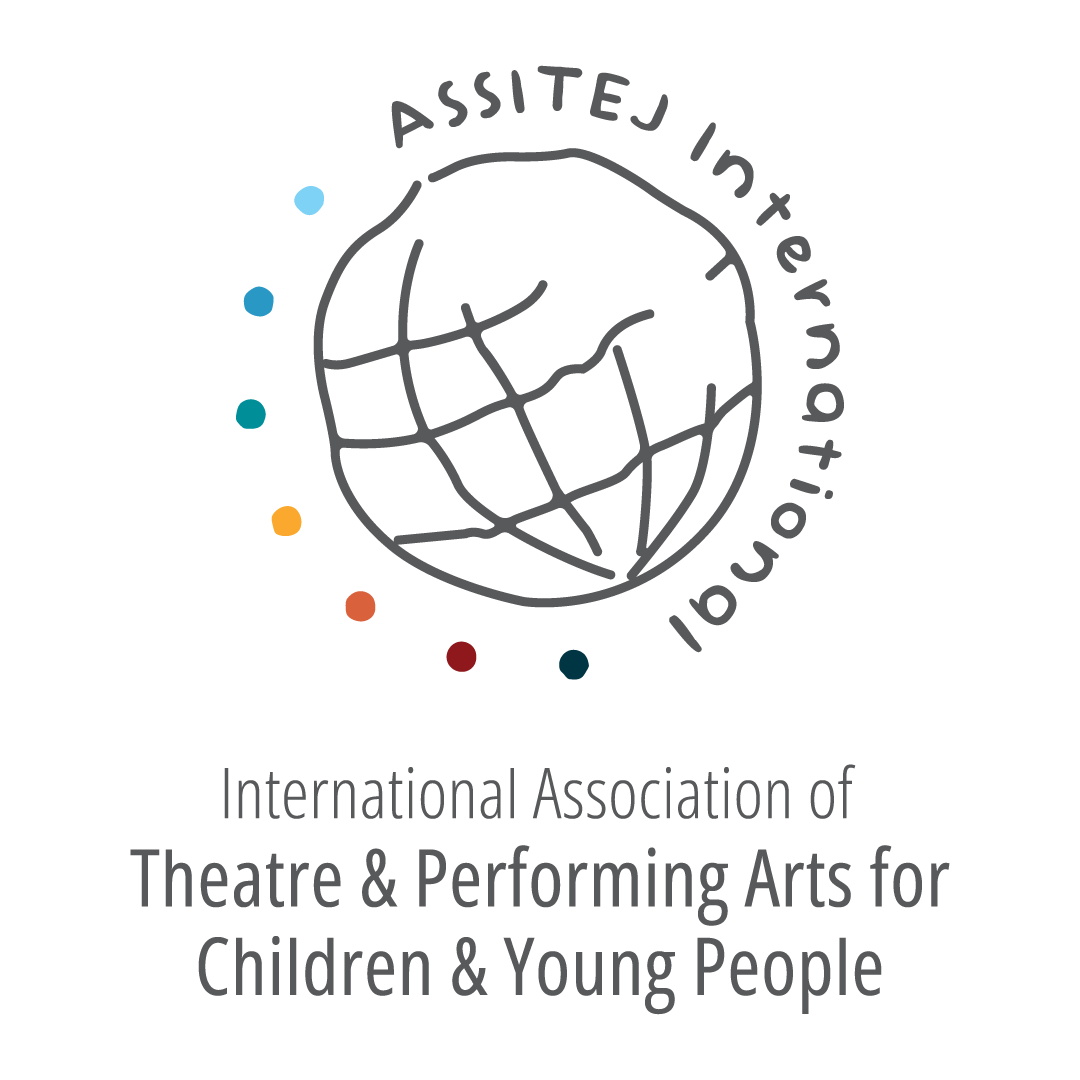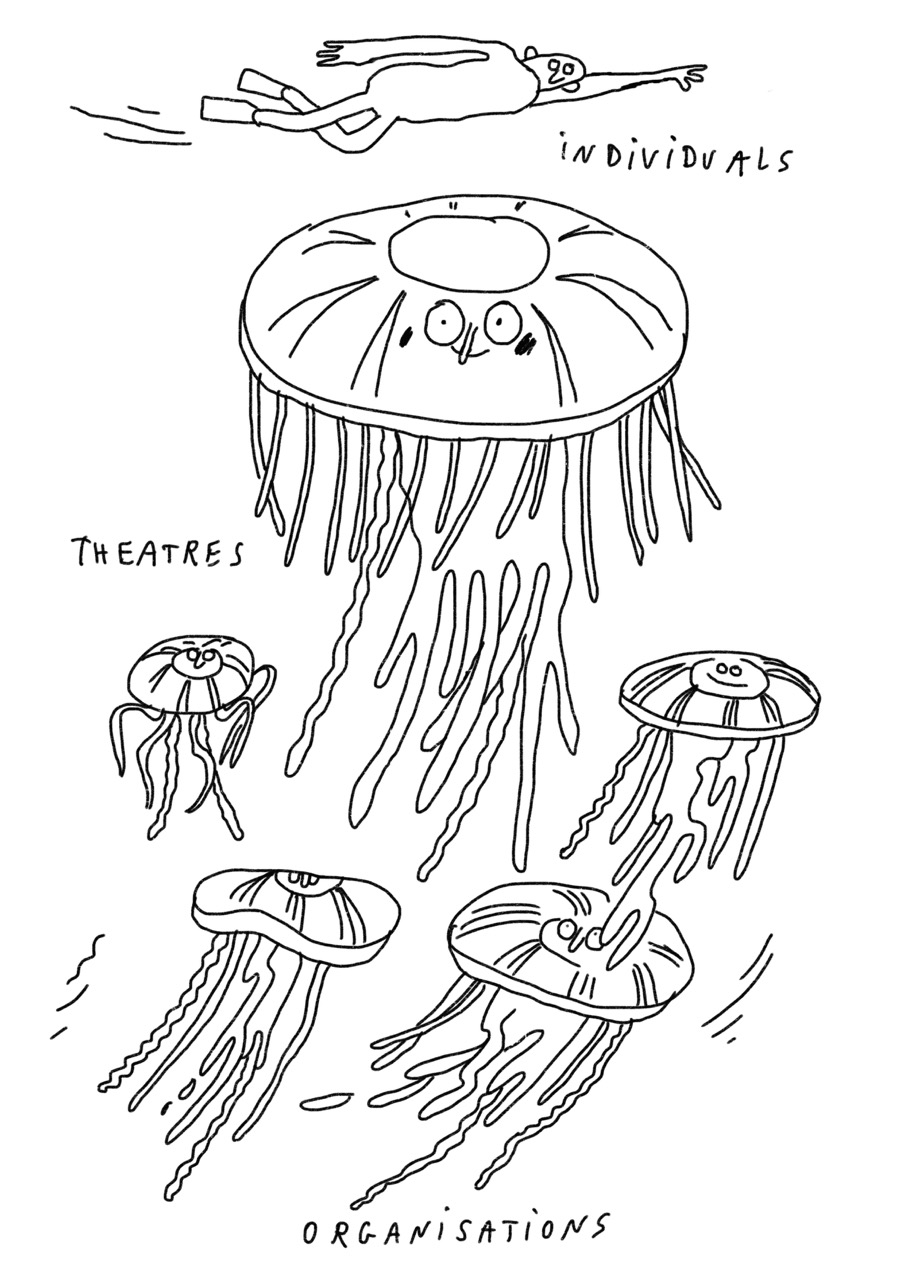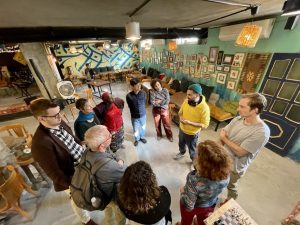I Am Because You Are.
The world, the planet, climate change, environment – these are big focus points for us all as we contemplate our impact on this earth. These are huge areas of concern, stress, and fear for children and young people. As practitioners in Theatre and Performing Arts for Children and Young People (TYA) around the world, we know it is essential that we respond in a determined manner. We have begun working to imagine the ways in which we can challenge our traditions, change our perspectives, move outside our comfort zones, and create new forms of artistic work. What do we take and what do we give back? Our planet must be handled with care.
Since 2023, ASSITEJ International has been part of the SHIFT initiative, an eco-certification programme established with 15 international cultural networks and in partnership with two environmental specialists: Culture for Climate Scotland and Vector42. Their leadership provides a structure to the scheme which focuses on improving, measuring, monitoring, and evaluating the efforts of networks such as ourselves toward sustainability. You may read more about the SHIFT Eco-Certification Programme further down this page.
This Sustainability Policy gives an overview of ASSITEJ International’s motivations, efforts, and goals as an organisation:
WHY WE CARE
We hope to raise awareness and inspire our members, both institutionally and individually, to think of ecologically sustainable ways of creating and touring theatre and performing arts for children and young people.
• As an Association that advocates for the rights of children, we support the younger generations in their right to a good future and recognise that this means questioning ourselves and our practice. This encourages ASSITEJ International to imagine pioneering ways we can set a good example in our particular sector.
• As a global community, we cannot take a position in which we prescribe or define what ecological sustainability means to all our members, nor do we believe in forcing a particular course of action upon any organisation or individual. We are well aware that we do not have answers or solutions to many of the questions. For us, becoming ecologically sustainable is always about empathy, solidarity, and respect for different approaches and priorities in different parts of the world.
OUR GOALS
We want to be consistent as advocates for children and young people.
This means that we take their right to have a healthy future, as well as taking their fears and worries regarding climate change and its consequences seriously.
We support their needs and claims not only artistically and socially but also through sustainable ecological approaches.
In the interests of consistency, we have set the following areas and priorities of action to ensure the sustainability of our work as ASSITEJ International:


TRAVEL
 ASSITEJ International brings people together to share knowledge and practice within the field of Theatre & Performing Arts for Children & Young People in order to deepen understanding, develop practice, and strengthen the global sector on behalf of all children everywhere.
ASSITEJ International brings people together to share knowledge and practice within the field of Theatre & Performing Arts for Children & Young People in order to deepen understanding, develop practice, and strengthen the global sector on behalf of all children everywhere.
ASSITEJ International creates spaces for international exchange of ideas and practice. By this definition, our organisation involves many people travelling to many places on a regular basis.
Nonetheless, we commit to reducing the footprint of our global community without affecting the mobility of our vital network:
• Members of the ASSITEJ International Executive Committee and ASSITEJ International staff members are asked to travel in ways that produce minimal emissions;
• Executive Committee meetings, Working Group meetings, and Committee meetings, as well as sessions for professional exchange between National Centres, International Professional Networks, and their members are often hosted in a virtual format and we continue to further explore possibilities here as technology continues to develop and offer us further possibilities for meaningful virtual engagement;
• We encourage the mobility of members and guests during our events to create the lowest possible emissions.
EVENTS
 For events co-organised by ASSITEJ International (such as the ASSITEJ Artistic Gatherings, ASSITEJ World Congresses and Performing Arts Festivals for Children & Young People, Regional Workshops, and Next Generation Residencies), we encourage and support the national level hosts to keep the ecological impact of each event as low as possible. On this behalf, ASSITEJ International:
For events co-organised by ASSITEJ International (such as the ASSITEJ Artistic Gatherings, ASSITEJ World Congresses and Performing Arts Festivals for Children & Young People, Regional Workshops, and Next Generation Residencies), we encourage and support the national level hosts to keep the ecological impact of each event as low as possible. On this behalf, ASSITEJ International:
• asks for reflections on ecological sustainability when National Centres submit a bid to be a future host;
• provides information and recommendations in the form of a ‘Green Rider’ which gives detailed advice on eco-friendly locations, catering, transport, and accommodation;
• includes an event-specific strategy, which focuses on the local host’s specific contexts, on how the event must be planned to be environmentally sustainable in the Memorandum of Understanding (MOU) between ASSITEJ International and the key local organisations involved in hosting the event;
• encourages both hosts and participants to think of ways they might choose to prolong their stay to make the relative impact of travel emissions more meaningful;
• recognises that local contexts should always be at the forefront of designing any plan, strategy, or other sustainability initiative.
COMMUNICATION & AWARENESS
 ASSITEJ International will communicate about its sustainability efforts:
ASSITEJ International will communicate about its sustainability efforts:
• in a new permanent section of its monthly digital newsletter for members;
• in Executive Committee meetings (both hosted on ground and online) at least twice a year for Executive Committee and staff members;
• through the various activities of the Sustainability Committee;
• through the various on the ground and online events produced or co-produced by ASSITEJ International.
GREEN TEAM
 ASSITEJ International has a ‘Green Team’ in charge of embedding ecological and environmental thinking and action into all of our activities so as to install a culture of ‘green reflex’ in the daily business of the Association.
ASSITEJ International has a ‘Green Team’ in charge of embedding ecological and environmental thinking and action into all of our activities so as to install a culture of ‘green reflex’ in the daily business of the Association.
The Green Team maintains, and regularly updates, a sustainable action plan to measure and manage the Association’s environmental impacts and emissions so that they may be reduced.
The Green Team consists of:
• Julia Dina Heße, Member of the Executive Committee of ASSITEJ International, Vice President of ASSITEJ Germany (Das Netzwerk der Kinder- und Jugendtheater in Deutschland), based in Tübingen, Germany;
• Émilie Robert, Member of the Executive Committee of ASSITEJ International, Co-President of ASSITEJ France (Scènes d’enfance), Artistic Director of Théatre La Massalia, based in Marseille, France;
• Seok-hong Kim, Vice President of the Executive Committee of ASSITEJ International, Board Member of ASSITEJ Korea, staff member of Korea Arts Management Service (KAMS);
• Chris Blois-Brooke, Staff Member of ASSITEJ International, Founder & Director of Performing Dialogue, based in London, United Kingdom.
We are well aware that many ASSITEJ members are already deeply committed to sustainable ecologies and environmental sustainability in their work and practice and rely on their sharing and cooperation.
Please feel free to email members of the Green Team (by clicking the links on their names above) whenever you have questions about our sustainability policy and engagement or if you want to support the work of ASSITEJ International’s sustainability initiatives.
WORKING SPACES
 As ASSITEJ International doesn’t have an office of its own, we cannot directly influence the design, running, and/or maintenance of the building(s) from which we are working.
As ASSITEJ International doesn’t have an office of its own, we cannot directly influence the design, running, and/or maintenance of the building(s) from which we are working.
Nonetheless, ASSITEJ International works with our staff and Executive Committee members to raise awareness of reducing, reusing, and recycling in their home or other institutional offices.
*We intend this sustainability policy to be a forever work-in-progress, a living document that continues to change as we identify more things we can do for the benefit of our planet.
Related Sustainability Matters
Whilst not part of the main Sustainability Policy, we have included here other important information which relates closely to it.
Sustainability Working Committee
The Sustainability Working Committee addresses the variety of ways in which sustainability can be understood, the environmental challenges to our arts community, illuminating frameworks and examples of innovative practice, and the concept of creative, sustainable practice.
The Sustainability Working Committee includes not only members of the ‘Green Team’ but also invited guests based on particular issues and/or upcoming events being produced or co-produced by ASSITEJ International.
You can read more about the committee by clicking here.

SHIFT Eco-Certification Programme
“The SHIFT eco-certification pilot phase is an opportunity to rethink our practices as international cultural networks and change our mindsets and behaviours. SHIFT guidelines give a perfect framework and support for this transformation. We hope the process will act as an inspiration for our members and wider (cultural) communities to act for the environment.”
The SHIFT pilot phase targets the development of a tailor-made scheme, leading to a first audit and green certification for the participating cultural networks. The guidelines for the certificate have been developed in the course of an Erasmus+ co-funded cooperation project.
“We are proud to participate in this pilot phase. This experience, and ultimately the certificate, will help us to establish a credible track record of concrete actions to be able to prove to future partners and to fund our commitment to become a more sustainable and socially responsible organisation.”
Participating networks have chosen a collaborative approach to implement this process. Facilitated by Culture for Climate Scotland and Vector42, this will be brought to life through regular workshops for all participants to review and reflect on progress while continually developing the guidelines underpinning certification.
During the first year of implementation of mandatory measures embedded in the SHIFT eco-guidelines, the work will not only be done with the core group of participating organisations but also discussed and shared with the members of the 16 network. This multiplying effect of the eco-certificate will be seen over the longer term through inspiring other networks (at international and national levels) or membership-based associations to green their practices while using the SHIFT eco-guidelines. Participating cultural networks believe that eventually, upon completion of the pilot phase, the eco-certificate will have the potential to become financially self-sustainable while bringing more networks into the certification process and a collective ‘eco-system’ of change.




